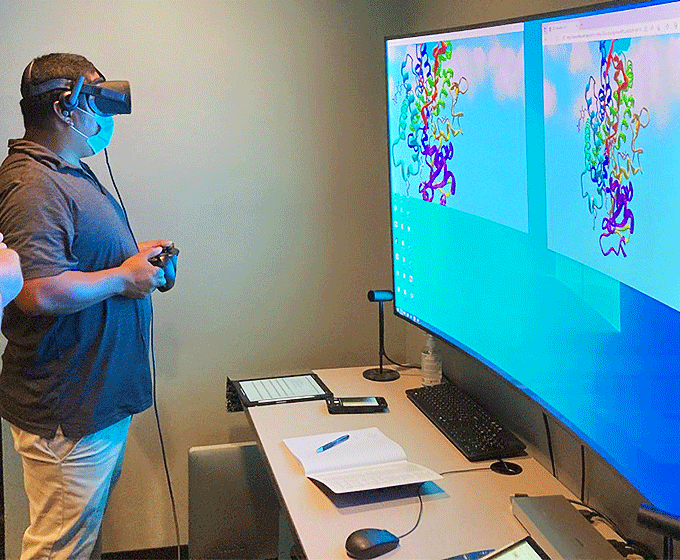
Francis Yoshimoto's Biochemistry II laboratory students were able to explore proteins in a unique way by utilizing virtual reality headsets in UTSA's VizLab.
MAY 9, 2022 — Francis Yoshimoto, assistant professor in the UTSA College of Sciences’ Department of Chemistry, is introducing his Biochemistry II laboratory students to a new way of learning—using virtual reality headsets to observe and analyze protein structures.
Yoshimoto’s students utilized the Department of Computer Science’s VizLab to set up these virtual reality (VR) headsets. Students created snapshots of a protein using traditional computer software—such as Chimera or Pymol—and then went to the same region of the protein in ProteinVR, a web-based molecular visualization program that allows one to see proteins with a VR headset.
After comparing the two images, the students prepared 3D snapshots of other proteins and their interactions with ligands or protein partners by searching the protein databank for other human health-related proteins, such as the SARS CoV-2 spike protein, which the coronavirus uses to invade human cells.
The 3D VR headsets proved an effective way to instruct students about protein structures—immersing them in a unique learning experience. Under the ProteinVR viewer with the Oculus headset, students could change their viewing angles of the protein and navigate forward and backward using the joystick on the Oculus hand controller. With the headset on, students could travel inside the protein. If they wanted to move in a different direction around the protein, they could simply tilt their heads while wearing the headset and continue to move forward and backward with the joystick.
“For over 15 years, I have been looking at proteins just on my computer screen,” Yoshimoto said. “Putting a virtual reality headset on to go inside an actual protein was truly an eye-opening experience for both myself and my students.”
Virtual reality technology is already in use in the biomedical industry. It has, for example, been used to aid pharmaceutical businesses in their work designing novel drugs—a recent advancement for developing new medicines. By receiving exposure and training in VR technology, Yoshimoto’s students were able to apply the skills they learn in the classroom in a way that is relevant to a future career in biomedical research. The project is representative of UTSA’s commitment to programs that provide students with a greater understanding of marketable skills needed in the workplace and are particularly important in linking classroom success to life after graduation for historically underserved populations.
Yoshimoto and his lab instructors partnered with the university’s Research Computing Support Group to arrange this VR learning experience.
UTSA is a Tier One research university and a Hispanic Serving Institution specializing in cyber, health, fundamental futures, and social-economic transformation. The university aspires to become a model for student success, a great public research university, and an exemplar for strategic growth and innovative excellence.
UTSA Today is produced by University Communications and Marketing, the official news source of The University of Texas at San Antonio. Send your feedback to news@utsa.edu. Keep up-to-date on UTSA news by visiting UTSA Today. Connect with UTSA online at Facebook, Twitter, Youtube and Instagram.
Move In To COLFA is strongly recommended for new students in COLFA. It gives you the chance to learn about the Student Success Center, campus resources and meet new friends!
Academic Classroom: Lecture Hall (MH 2.01.10,) McKinney Humanities BldgWe invite you to join us for Birds Up! Downtown, an exciting welcome back event designed to connect students with the different departments at the Downtown Campus. Students will have the opportunity to learn about some of the departments on campus, gain access to different resources, and collect some giveaways!
Bill Miller PlazaJoin us for an intimate evening of cocktails, conversation, and culinary inspiration with Pati Jinich, Emmy-nominated chef and James Beard Award-winning author. Enjoy light bites and signature drinks in the warm, modern setting of Mezquite as Pati connects with guests over her passion for Mexican cuisine and storytelling.
Mezquite Restaurant in Pullman Market, 221 Newell Ave., San Antonio 78215From inspired courses to thoughtful pairings and a rich sense of community, the Ven a Comer Signature Dinner is a night of shared meals, shared stories, and unforgettable flavor.
Stable Hall (Pear Brewery), 307 Pearl Pkwy, San Antonio 78215Come and celebrate this year's homecoming at the Downtown Campus with food, games, giveaways, music, and more. We look forward to seeing your Roadrunner Spirit!
Bill Miller PlazaThe University of Texas at San Antonio is dedicated to the advancement of knowledge through research and discovery, teaching and learning, community engagement and public service. As an institution of access and excellence, UTSA embraces multicultural traditions and serves as a center for intellectual and creative resources as well as a catalyst for socioeconomic development and the commercialization of intellectual property - for Texas, the nation and the world.
To be a premier public research university, providing access to educational excellence and preparing citizen leaders for the global environment.
We encourage an environment of dialogue and discovery, where integrity, excellence, respect, collaboration and innovation are fostered.